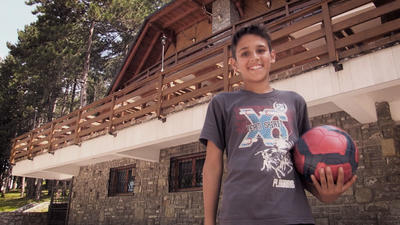More than 11 months after the start of the emergency response to help refugees from the Central African Republic to the east of Cameroon, the work of Médecins Sans Frontières/Doctors without Borders (MSF) continues. These refugees remain vulnerable with many suffering from psychological trauma.
In Batouri and Garoua-Boulaï, conventional medical treatment for child malnutrition is being offered in conjunction with psychosocial support. This multi-disciplinary approach, which includes mental health activities for malnourished children and their families, promotes the recovery of the young patients.
Interview with Mira Demachkié, psychologist and mental health coordinator
Why is mental health being combined with treatment for malnutrition?
Helping malnourished children back to health entails much more than just giving them food. We know that a malnourished patient's mental health can have a positive or negative impact on the progression of the condition.
Physical and emotional stimulation are essential for proper child development. Malnourished children often suffer from apathy or a regression in motor skills. When the child no longer responds to its mother's stimulation, there is a risk that the mother will give the child less attention. We aim to improve recovery by strengthening the parent or carer's bond with the sick child.
At MSF, we are keen to increasingly integrate mental health activities with nutritional care. Indeed, mental health deserves attention in any context. For now, psychological support is mainly offered in contexts of war or displacement, like here in Cameroon or at Dadaab camp in Kenya.
Most of the patients admitted to our nutrition centres in the region are refugees who have fled from the Central African Republic. These families have experienced war and displacement. Some of them have witnessed friends and family being killed or tortured.
These gruelling experiences trigger psychological reactions that deserve our full attention, as they can slow down the recovery of a patient's state of health. Consequently, we also offer individual consultations to patients or family members who could benefit from them and are open to receiving our support.
What activities are being carried out?
Besides individual consultations, we hold parent-child group sessions where we explain aspects of nutrition to the parents (or carer), highlight the importance of their role and build up their self-esteem. These people are prominent in the lives of the young patients, and will help the youngsters grow and interact with the world around them.
During the sessions, we encourage emotional stimulation of the child and stress the importance of eye contact and touch. Working with the health promotion team, we organise role plays, and we invite the parent to play with the child, or we encourage them to dance or draw together.
At first, this was a bit difficult because mothers or carers traditionally don’t play with their children. Each culture has its own way of demonstrating affection and here, mothers sing, breast feed or gently rock their babies on their backs.
For children who are medically stable, we also suggest that the mothers massage them, as that provides excellent physical stimulation. And, above all, we show parents that children who do not speak can respond in different ways, by smiling, for example.
The group sessions with the psychologists work very well. The mothers support each other and more and more of them want to take part in the activities.
How is this support affecting the children's health?
Children are very sensitive to what they get - or not - from their parents or care givers. A sick child that is neglected has little will to survive.
The World Health Organisation has shown that strengthening the parent-child bond and giving psycho-social support during the treatment of malnutrition have a positive effect on nutritional recovery. What's more, if, for example, a mother feels strong psychologically, she will, in turn, give more attention to her baby, which will help the child get better sooner.
Improvements in the health of a child under treatment can be seen after just a few sessions. We also observe distinct progress in those parents who respond appropriately to the emotional needs of their children and feel enjoyment in doing so.
Meanwhile, where medical treatment is given (without mental health support for the child and the parent or carer), there is a greater chance of parents leaving the nutritional centre before the child’s treatment has ended, thereby compromising its recovery.
Integrating mental health activities with medical care and health promotion improves the overall treatment of patients suffering from malnutrition; these activities need to go hand-in-hand. This is also an example of a great unit at the heart of the MSF teams, which highlights the benefits of and need for mental health activities.





